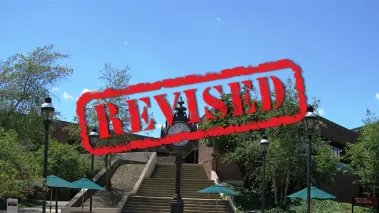Table of Contents
Speech Code of the Month: Indiana University, Southeast

FIRE announces its Speech Code of the Month for July 2012: Indiana University, Southeast (IUS).
According to IUS' Code of Student Rights, Responsibilities, and Conduct, "the university recognizes the rights of all students to engage in discussion, to express thoughts and opinions, and to assemble, speak, write, publish or invite speakers on any subject without university interference or fear of university disciplinary action." (Emphasis added.)
But IUS also maintains "Guidelines Relating to Free Speech" that amount to severe "university interference" with the rights IUS claims to value-rights which, as a public university, IUS is legally bound to uphold. The Guidelines provide, in relevant part, that
Persons wishing to express their opinions, distribute materials or assemble on campus in accordance with the state and federal constitution in relation to their right to free speech, must submit an Application to Schedule Facilities form. ... This Application should be submitted at least five (5) days prior to the event. Approval must be granted before an event can take place.
According to the plain language of this policy, students may only "express opinions" within the free speech zone. IUS almost certainly doesn't mean this—technically, if you want to tell your friend that you think it's hot outside, you have to go to the zone to do it—but it's an indicator of just how poorly written and unconstitutional this policy is. (FIRE is assuming here that IUS does not actually intend its classes to be a thought-and opinion-free zone.)
But that's not all—not by a long shot. First, the notice-and-permit scheme is constitutionally impermissible. As the U.S. Supreme Court has stated, "It is offensive—not only to the values protected by the First Amendment, but to the very notion of a free society—that in the context of everyday public discourse a citizen must first inform the government of her desire to speak to her neighbors and then obtain a permit to do so." Watchtower Bible and Tract Society of NY, Inc. v. Village of Stratton, 536 U.S. 150, 165–66 (2002).
While the policy does provide that the 5-day notice can be waived if "burdensome," the waiver is wholly "at the Director of Campus Life's discretion," with no criteria provided for approval. This kind of unfettered discretion is an invitation to arbitrary application or, worse yet, to viewpoint-based double standards. Moreover, even if the notice is waived, prior approval is still required for any "persons wishing to express their opinions" on IUS' campus.
As if that were not bad enough, the policy further provides that
IUS has the right to determine time, place and manner. The free speech area on campus is customarily in the McCullough Plaza. However, other locations which do not disrupt functions of the university may be identified by the Director of Campus Life in consultation with University Police.
As someone in the IUS administration must know (right?), "the right to determine time, place and manner" is far from absolute, and it certainly does not include the right to limit the expressive activities of more than 6,000 students to one plaza on a 180-acre campus. While universities may establish "reasonable" time, place and manner restrictions (see Ward v. Rock Against Racism, 491 U.S. 781 (1989)), the case law makes abundantly clear that IUS' policy does not even approach "reasonable." Time and again, courts have determined that to be considered legal, "time, place and manner" restrictions must be "narrowly tailored" to serve a significant governmental interest, leaving open ample alternative channels for communication. Limiting all expressive activities to one free speech zone on campus, and placing a prior restraint on speech even within that zone, does not nearly meet this standard.
IUS' policy is strikingly similar to the University of Cincinnati's former free speech zone policy, which was just enjoined last month by a federal judge in Ohio. Like IUS, the University of Cincinnati limited all expressive activities to just one area of campus, and required a substantial amount of prior notice (anywhere from 5 to 15 days, depending on which policy you were reading) for speech even within that area. That policy was challenged in court this year by a student group wishing to collect signatures outside of the designated area for an Ohio ballot initiative. Although the university administration had vigorously defended the policy against FIRE's criticisms in 2008, the federal judge hearing the case found that the university's policy "violates the First Amendment and cannot stand." Before defending its own policy, the IUS administration would do well to read that decision in full.
IUS' free speech zone policy is a serious infringement on the First Amendment rights that the university is legally and morally obligated to uphold. For this reason, it is our July 2012 Speech Code of the Month.
If you believe that your college's or university's policy should be a Speech Code of the Month, please email speechcodes@thefire.org with a link to the policy and a brief description of why you think attention should be drawn to this code. If you are a current college student or faculty member interested in free speech, consider joining FIRE's Campus Freedom Network, an organization of college faculty members and students dedicated to advancing individual liberties on their campuses. You also can add FIRE's Speech Code of the Month Widget to your blog or website and help shed some much-needed sunlight on these repressive policies.
Recent Articles
FIRE’s award-winning Newsdesk covers the free speech news you need to stay informed.

FIRE to defend veteran pollster J. Ann Selzer in Trump lawsuit over outlier election poll

Meta’s content moderation changes closely align with FIRE recommendations

FIRE statement on legislative proposals to regulate artificial intelligence
